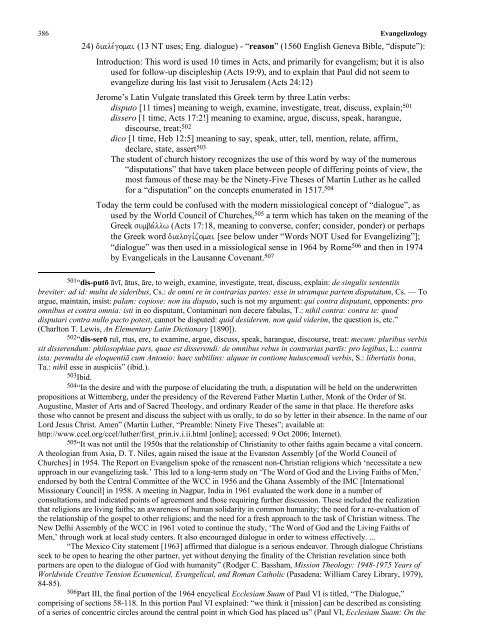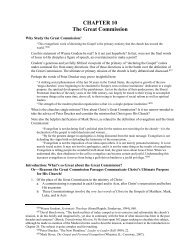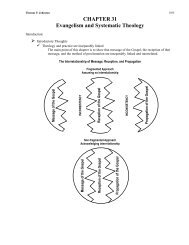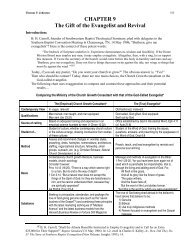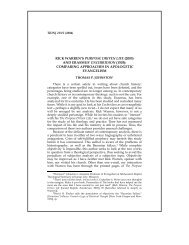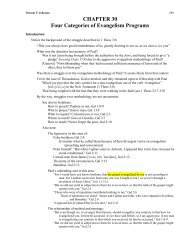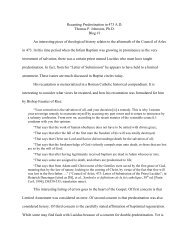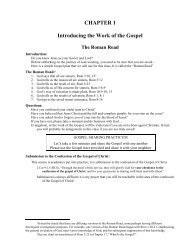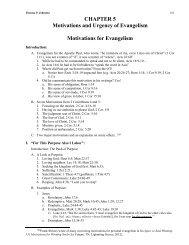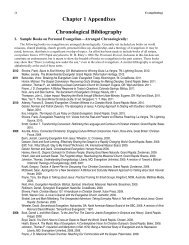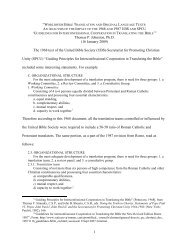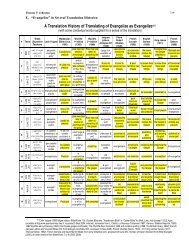CHAPTER 7 Defining Evangelizing - Evangelism Unlimited
CHAPTER 7 Defining Evangelizing - Evangelism Unlimited
CHAPTER 7 Defining Evangelizing - Evangelism Unlimited
Create successful ePaper yourself
Turn your PDF publications into a flip-book with our unique Google optimized e-Paper software.
386 Evangelizology<br />
24) diale,gomai (13 NT uses; Eng. dialogue) - “reason” (1560 English Geneva Bible, “dispute”):<br />
Introduction: This word is used 10 times in Acts, and primarily for evangelism; but it is also<br />
used for follow-up discipleship (Acts 19:9), and to explain that Paul did not seem to<br />
evangelize during his last visit to Jerusalem (Acts 24:12)<br />
Jerome’s Latin Vulgate translated this Greek term by three Latin verbs:<br />
disputo [11 times] meaning to weigh, examine, investigate, treat, discuss, explain; 501<br />
dissero [1 time, Acts 17:2!] meaning to examine, argue, discuss, speak, harangue,<br />
discourse, treat; 502<br />
dico [1 time, Heb 12:5] meaning to say, speak, utter, tell, mention, relate, affirm,<br />
declare, state, assert503 The student of church history recognizes the use of this word by way of the numerous<br />
“disputations” that have taken place between people of differing points of view, the<br />
most famous of these may be the Ninety-Five Theses of Martin Luther as he called<br />
for a “disputation” on the concepts enumerated in 1517. 504<br />
Today the term could be confused with the modern missiological concept of “dialogue”, as<br />
used by the World Council of Churches, 505 a term which has taken on the meaning of the<br />
Greek sumba,llw (Acts 17:18, meaning to converse, confer; consider, ponder) or perhaps<br />
the Greek word dialogi,zomai [see below under “Words NOT Used for <strong>Evangelizing</strong>”];<br />
“dialogue” was then used in a missiological sense in 1964 by Rome506 and then in 1974<br />
by Evangelicals in the Lausanne Covenant. 507<br />
501 “dis-putō āvī, ātus, āre, to weigh, examine, investigate, treat, discuss, explain: de singulis sententiis<br />
breviter: ad id: multa de sideribus, Cs.: de omni re in contrarias partes: esse in utramque partem disputatum, Cs. — To<br />
argue, maintain, insist: palam: copiose: non ita disputo, such is not my argument: qui contra disputant, opponents: pro<br />
omnibus et contra omnia: isti in eo disputant, Contaminari non decere fabulas, T.: nihil contra: contra te: quod<br />
disputari contra nullo pacto potest, cannot be disputed: quid desiderem, non quid viderim, the question is, etc.”<br />
(Charlton T. Lewis, An Elementary Latin Dictionary [1890]).<br />
502 “dis-serō ruī, rtus, ere, to examine, argue, discuss, speak, harangue, discourse, treat: mecum: pluribus verbis<br />
sit disserendum: philosophiae pars, quae est disserendi: de omnibus rebus in contrarias partīs: pro legibus, L.: contra<br />
ista: permulta de eloquentiā cum Antonio: haec subtilins: alquae in contione huiuscemodi verbis, S.: libertatis bona,<br />
Ta.: nihil esse in auspiciis” (ibid.).<br />
503 Ibid.<br />
504 “In the desire and with the purpose of elucidating the truth, a disputation will be held on the underwritten<br />
propositions at Wittemberg, under the presidency of the Reverend Father Martin Luther, Monk of the Order of St.<br />
Augustine, Master of Arts and of Sacred Theology, and ordinary Reader of the same in that place. He therefore asks<br />
those who cannot be present and discuss the subject with us orally, to do so by letter in their absence. In the name of our<br />
Lord Jesus Christ. Amen” (Martin Luther, “Preamble: Ninety Five Theses”; available at:<br />
http://www.ccel.org/ccel/luther/first_prin.iv.i.ii.html [online]; accessed: 9 Oct 2006; Internet).<br />
505 “It was not until the 1950s that the relationship of Christianity to other faiths again became a vital concern.<br />
A theologian from Asia, D. T. Niles, again raised the issue at the Evanston Assembly [of the World Council of<br />
Churches] in 1954. The Report on <strong>Evangelism</strong> spoke of the renascent non-Christian religions which ‘necessitate a new<br />
approach in our evangelizing task.’ This led to a long-term study on ‘The Word of God and the Living Faiths of Men,’<br />
endorsed by both the Central Committee of the WCC in 1956 and the Ghana Assembly of the IMC [International<br />
Missionary Council] in 1958. A meeting in Nagpur, India in 1961 evaluated the work done in a number of<br />
consultations, and indicated points of agreement and those requiring further discussion. These included the realization<br />
that religions are living faiths; an awareness of human solidarity in common humanity; the need for a re-evaluation of<br />
the relationship of the gospel to other religions; and the need for a fresh approach to the task of Christian witness. The<br />
New Delhi Assembly of the WCC in 1961 voted to continue the study, ‘The Word of God and the Living Faiths of<br />
Men,’ through work at local study centers. It also encouraged dialogue in order to witness effectively. ...<br />
“The Mexico City statement [1963] affirmed that dialogue is a serious endeavor. Through dialogue Christians<br />
seek to be open to hearing the other partner, yet without denying the finality of the Christian revelation since both<br />
partners are open to the dialogue of God with humanity” (Rodger C. Bassham, Mission Theology: 1948-1975 Years of<br />
Worldwide Creative Tension Ecumenical, Evangelical, and Roman Catholic (Pasadena: William Carey Library, 1979),<br />
84-85). 506Part III, the final portion of the 1964 encyclical Ecclesiam Suam of Paul VI is titled, “The Dialogue,”<br />
comprising of sections 58-118. In this portion Paul VI explained: “we think it [mission] can be described as consisting<br />
of a series of concentric circles around the central point in which God has placed us” (Paul VI, Ecclesiam Suam: On the


